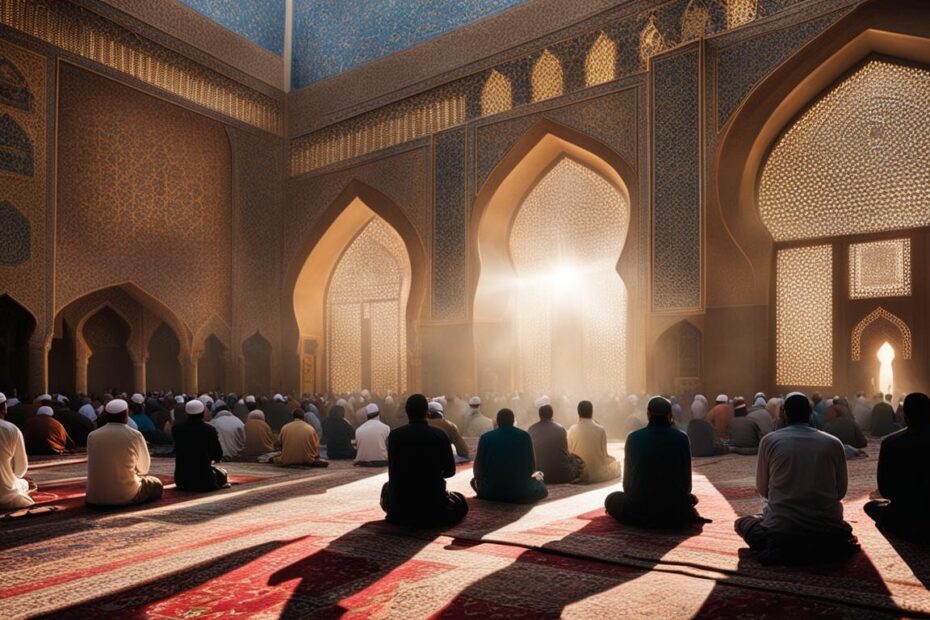Muslim prayer traditions and rituals, deeply rooted in Islamic practice, form an essential part of the daily lives of millions of Muslims worldwide. From the five daily prayers to the observance of fasting during Ramadan, these rituals hold great significance for believers, fostering a sense of spiritual connection, devotion, and submission to God.
Key Takeaways:
- Muslim prayer traditions, also known as salāt, consist of five daily canonical prayers.
- These prayers can be performed individually or in congregation at a mosque.
- Muslims perform ablutions before each prayer to purify themselves.
- The mosque plays a central role in the practice of Muslim prayer traditions.
- Fasting during Ramadan and the pilgrimage to Mecca are significant aspects of Muslim prayer.
The Five Daily Prayers
In Islam, performing the five daily prayers, also known as salah, is an essential part of the faith. These prayers are a means of expressing devotion to Allah, seeking spiritual connection, and seeking guidance and blessings in daily life. The five daily prayers are performed at different times throughout the day, aligning with the natural rhythm of the sun’s movements.
1. Fajr (Dawn): The first prayer of the day is performed before sunrise. This is a time of solitude and reflection, where Muslims begin their day by seeking Allah’s guidance and blessings.
2. Dhuhr (Noon): The second prayer is performed just after noon. It serves as a break from daily activities, allowing Muslims to connect with Allah and seek spiritual rejuvenation in the midst of a busy day.
3. Asr (Afternoon): The third prayer is performed in the late afternoon. It serves as a pause before the transition from the active day to the calmness of evening, a time to seek Allah’s forgiveness and mercy.
4. Maghrib (Sunset): The fourth prayer is performed immediately after sunset. It is a time of gratitude and reflection, where Muslims express thanks for the blessings of the day and seek Allah’s protection for the night ahead.
5. Isha (Night): The fifth and final prayer is performed before bedtime. It is a time of introspection and surrender, where Muslims seek Allah’s forgiveness for the day’s shortcomings and ask for His guidance in their dreams and actions.
Each prayer consists of specific recitations, known as surahs, from the Qur’an, as well as physical postures, including standing, bowing, and prostrating. These physical movements serve as a means of demonstrating humility, gratitude, and submission to Allah.
Muslims are encouraged to perform these prayers in congregation at a mosque, as it fosters a sense of unity and community among believers. However, if one is unable to go to the mosque, the prayers can also be performed individually. The important aspect is to prioritize the daily connection with Allah through the practice of salah.
The performance of the five daily prayers offers a sense of purpose, discipline, and devotion in the lives of Muslims. It serves as a constant reminder of the presence of Allah and the importance of seeking His guidance and blessings in all aspects of life.
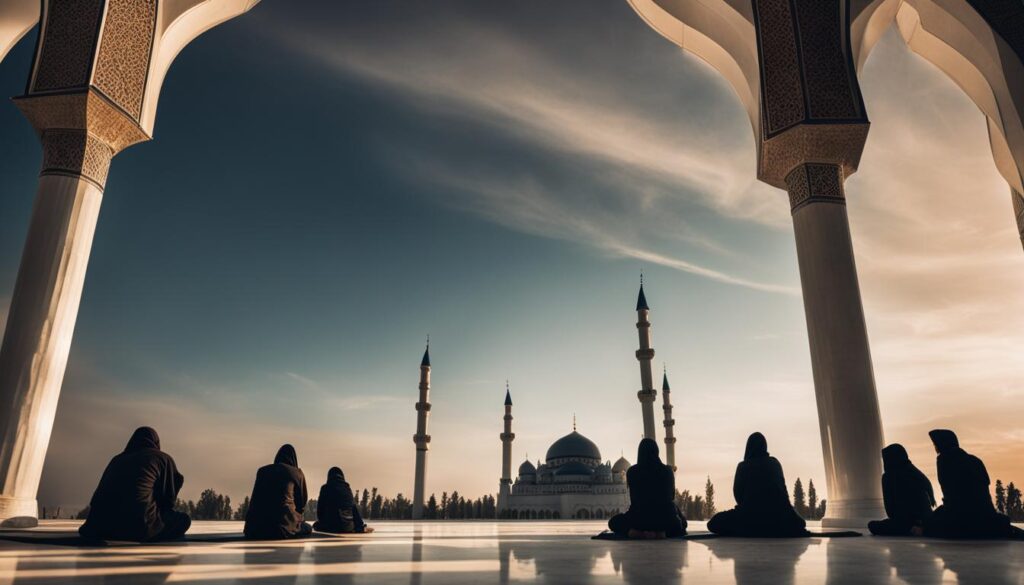
Ablutions and Prayer Etiquette
Before each prayer, Muslims perform ablutions, known as wudu, which involves washing the hands, face, and feet. This cleansing ritual is considered a form of purification, both physically and spiritually, before entering into the presence of God. Ablutions symbolize the importance of inward and outward purity in Islam.
Alongside ablutions, prayer etiquette plays a crucial role in Muslim prayer traditions. Proper decorum and respectful conduct during prayer reflect the deep reverence and devotion Muslims have for their Creator. It is believed that observing prayer etiquette enhances the spiritual experience and allows for a more profound connection with the divine.
Here are some key prayer etiquettes followed by Muslims:
- Wearing appropriate clothing that covers the body modestly and respects the sanctity of the prayer space.
- Facing the qibla, the direction of the Kaaba in Mecca, during prayer.
- Maintaining focus and concentration, avoiding distractions, and clearing the mind of worldly thoughts.
- Observing a state of humility and submission to God, recognizing His greatness and seeking His mercy.
- Refraining from talking or engaging in worldly matters during prayer.
Prayer etiquette serves as a reminder of the significance of prayer in Islam. It fosters an atmosphere of devotion, reverence, and spiritual mindfulness. By adhering to these etiquettes, Muslims strive to create a sacred space for communion with the Almighty.
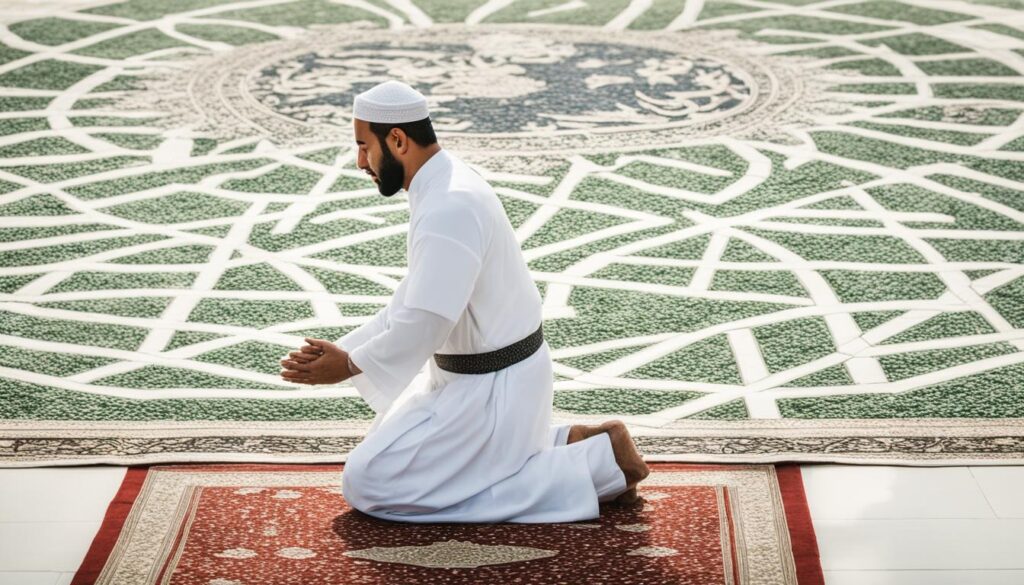
“Prayer is not asking. It is a longing of the soul. It is daily admission of one’s weakness. It is better in prayer to have a heart without words than words without a heart.” – Mahatma Gandhi
Friday Prayers and Special Congregational Prayers
Friday prayer holds a special significance in Islam. Instead of the regular prayer just after noon, Muslims gather at the mosque for the Friday prayer, which consists of a sermon (khuṭbah) delivered by the imam. The sermon usually includes recitation of verses from the Qur’an and addresses moral, social, or political issues.
“And when the prayer has been concluded, disperse within the land and seek from the bounty of Allah, and remember Allah often that you may succeed.” – Qur’an 62:10
Special congregational prayers are also offered during the holy month of Ramadan, known as tarāwīḥ. These prayers are performed after the evening prayer and are lengthier than the regular prayers. Muslims gather in the mosque to recite longer portions of the Qur’an and seek spiritual fulfillment before retiring for the night.
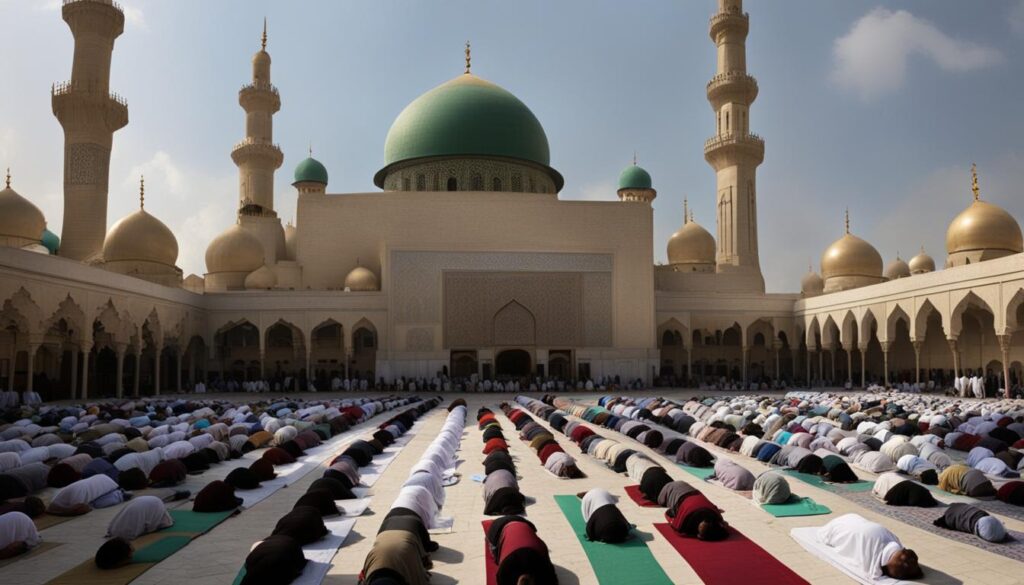
Friday prayers and special congregational prayers are important occasions for Muslims to gather as a community, reaffirm their faith, and seek guidance and inspiration.
Nocturnal and Voluntary Prayers
Nocturnal prayers, called tahajjud, hold a special place in the hearts of Muslims. These optional prayers are performed during the latter half of the night and are considered an act of devotion and seeking closeness to God. Muslims have the opportunity to wake up before dawn and engage in deep spiritual connection through tahajjud prayers. It is a time of solitude and reflection, where one can seek forgiveness, guidance, and blessings from the Almighty.
The tahajjud prayers are not obligatory, but they are a highly recommended way to enhance one’s spiritual journey. It is an opportunity to offer additional prayers beyond the five daily obligatory prayers. By devoting oneself to these nocturnal prayers, Muslims can deepen their relationship with God and cultivate a sense of peace and tranquility in their lives.
Throughout the year, Muslims are also encouraged to perform voluntary prayers, known as nafl prayers. These prayers can be performed at any time outside of the obligatory prayers and serve as a means to express gratitude and seek blessings from Allah. They provide an avenue for believers to strengthen their connection with God and seek His guidance and mercy in their lives.
Engaging in nocturnal and voluntary prayers is an act of dedication, self-discipline, and devotion. It is a personal journey that allows Muslims to reflect on their faith, seek divine intervention, and find solace in the presence of God. These additional prayers are a testament to the commitment and sincerity of individuals in their quest for spiritual growth and closeness to the Creator.
Let us cherish these moments of solitude and seek the blessings that come from dedicating ourselves to the worship of God through nocturnal and voluntary prayers.
Zakat – Obligatory Tax for the Poor
Zakat is an essential component of Islamic practice, emphasizing the importance of charitable giving and social responsibility. In Islam, zakat is an obligatory tax that Muslims are required to pay annually on specific types of wealth. This act of giving is not only a means of purifying one’s wealth but also a means of assisting the less fortunate members of society.
Zakat plays a crucial role in promoting economic justice and addressing the wealth disparity within Muslim communities. By redistributing wealth, zakat helps to bridge the gap between the affluent and the impoverished, fostering a sense of unity and compassion among believers.
The amount of zakat payable varies depending on the category of wealth, including grains, fruits, cash, and precious metals. The calculation of zakat is typically based on a specific percentage of one’s total wealth or income, ensuring a fair and equitable distribution of resources.
Zakat not only provides crucial support to those in need but also serves as a reminder of the transitory nature of wealth and the fundamental principle of selflessness in Islam.
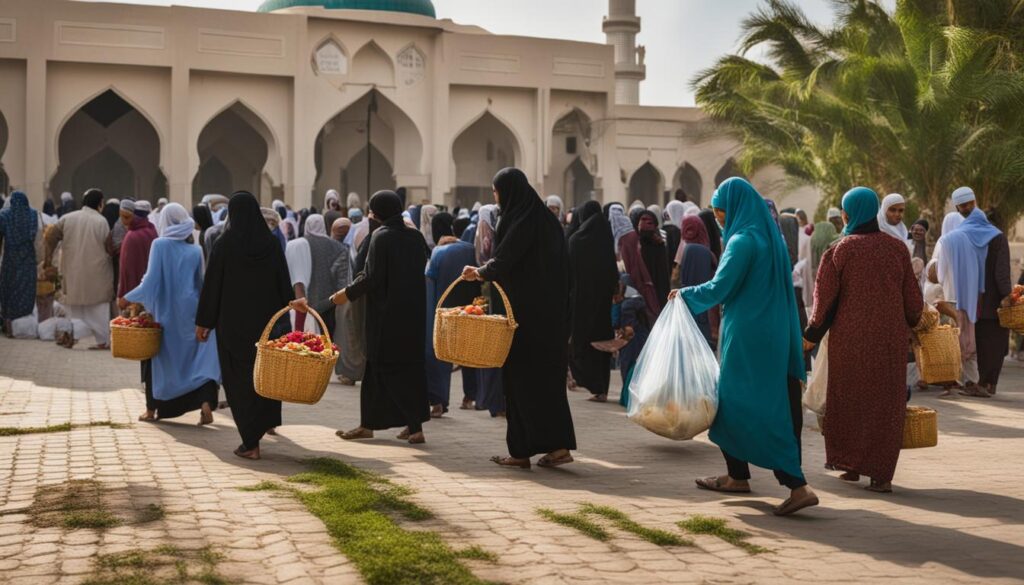
Zakat Categories:
| Category of Wealth | Zakat Calculation |
|---|---|
| Grains and fruits | A certain percentage (e.g., 10%) of the harvest’s market value. |
| Cash and savings | A specific percentage (e.g., 2.5%) of the total savings held for a lunar year. |
| Precious metals | A specific percentage (e.g., 2.5%) of the market value of gold, silver, or other precious metals owned for one lunar year. |
Zakat is primarily directed towards helping the poor and needy members of the community. The collected funds are utilized to provide food, shelter, healthcare, education, and other essential services to those who are less fortunate. Additionally, zakat can also be used for other purposes such as supporting orphans, freeing slaves, paying off debts, and contributing to the general welfare of society.
Zakat is more than a mere financial obligation; it is a spiritual duty that helps Muslims cultivate gratitude, empathy, and generosity. By fulfilling this obligation, believers not only contribute to the betterment of society but also attain spiritual purification and closer proximity to their faith.
Fasting during Ramadan
Fasting during the month of Ramadan, the ninth month of the Islamic lunar calendar, is one of the five pillars of Islam. It involves abstaining from food, drink, and other physical needs from dawn to sunset. Fasting during Ramadan is a time of spiritual reflection, self-discipline, and increased devotion to God.
Muslims believe that fasting during Ramadan has numerous spiritual and health benefits. It is a means of drawing closer to God and seeking His forgiveness. The act of fasting teaches Muslims patience, self-control, and empathy for those less fortunate. It is a time of heightened spirituality, increased prayer, and reflection on the blessings of life. Fasting also serves as a reminder of the importance of gratitude and the need to give back to the community.
The act of abstaining from food and drink during daylight hours can have several health benefits. It gives the digestive system a break and allows the body to detoxify. Fasting has been shown to promote weight loss, reduce inflammation, improve insulin sensitivity, and lower the risk of chronic diseases such as diabetes and heart disease.
During Ramadan, Muslims break their fast at sunset with a meal called iftar. This meal typically consists of dates, water, and a variety of traditional dishes. The pre-dawn meal before the fast begins is called suhoor and provides sustenance for the day ahead.
The Spiritual Significance of Fasting
“O you who have believed, decreed upon you is fasting as it was decreed upon those before you that you may become righteous.” – Qur’an 2:183
Fasting during Ramadan is not just about abstaining from food and drink; it is a holistic act of worship that encompasses the mind, body, and spirit. By practicing self-discipline and self-control, Muslims purify their hearts and cultivate a sense of gratitude and humility.
Through fasting, Muslims experience a heightened awareness of God’s presence and focus their attention on spiritual matters. It is a time for sincere repentance, seeking forgiveness, and striving to improve one’s character. Fasting during Ramadan is a spiritual journey that allows Muslims to deepen their relationship with God, strengthen their faith, and renew their commitment to living a righteous life.
The month of Ramadan is also a time for increased prayer and recitation of the Qur’an. Muslims spend more time in the mosque, engaging in communal worship and seeking spiritual guidance. The night prayers, known as Taraweeh, are a special feature of Ramadan and provide an opportunity for believers to engage in prolonged periods of prayer and reflection.
The Blessings of Ramadan
As Muslims fast from sunrise to sunset, they experience firsthand the struggles faced by those who are less fortunate. It fosters empathy and encourages acts of charity and generosity. Muslims are encouraged to give to the poor and engage in acts of kindness throughout the month of Ramadan.
Ramadan is also a time of increased social connection and community bonding. Families and friends gather for iftar meals and break their fast together. The sense of shared sacrifice and devotion creates a strong sense of unity and solidarity among Muslims worldwide.
The benefits of fasting extend beyond the spiritual and physical realms. It is a time of self-reflection and personal growth. Muslims often set goals for themselves during Ramadan, whether it’s breaking a bad habit, improving their character, or deepening their knowledge of the Qur’an. The discipline and dedication required during Ramadan can inspire positive changes that last beyond the month.
In conclusion, fasting during Ramadan is a deeply meaningful and transformative experience for Muslims. It is an act of worship that combines physical discipline with spiritual devotion. The month of Ramadan provides a unique opportunity for self-reflection, increased prayer, and acts of charity. It is a time of renewed spiritual connection and an opportunity to draw closer to God.
The Hajj – Pilgrimage to Mecca
The Hajj pilgrimage to Mecca is a sacred journey undertaken by every financially and physically capable Muslim. It is a once-in-a-lifetime obligation and a remarkable event that unites Muslims from all over the world in a spiritual quest of unity, humility, and devotion to God.
The Hajj involves a series of sacred rituals and prayers performed in and around the holy sites of Mecca. Pilgrims gather in the designated months of the Islamic lunar calendar to embark on this transformative journey. They dress in simple white garments, symbolizing purity and equality, as they fulfill the rites prescribed by God and follow in the footsteps of Prophet Muhammad.
During the Hajj, pilgrims perform rituals such as the Tawaf, circumambulating the Kaaba, Islam’s holiest shrine, seven times while supplicating and reflecting upon their faith. They also traverse between the hills of Safa and Marwa as an act of remembrance and gratitude for the story of Hagar, the wife of Prophet Ibrahim (Abraham).
| Ritual | Description |
|---|---|
| Tawaf | Circumambulation of the Kaaba seven times in a counterclockwise direction. |
| Sa’i | Running or walking between the hills of Safa and Marwa as a commemoration of Hagar’s search for water. |
| Mount Arafat | Gathering on the plains of Arafat, spending the day in prayer and supplication. |
| Stoning of the Devil | Casting pebbles at pillars symbolizing Satan’s temptation. |
| Eid al-Adha | Celebration of sacrifice, commemorating Prophet Ibrahim’s willingness to sacrifice his son. |
The Hajj is a deeply spiritual experience, fostering a sense of introspection, gratitude, and unity among Muslims. It serves as a reminder of the equality and diversity that exist within the Muslim ummah, or community, as people from different backgrounds and cultures gather to fulfill this sacred duty.
Completing the Hajj is considered a pinnacle achievement in a Muslim’s life, fulfilling a lifelong aspiration and leaving a lasting impact on the pilgrims’ spirituality and commitment to their faith.
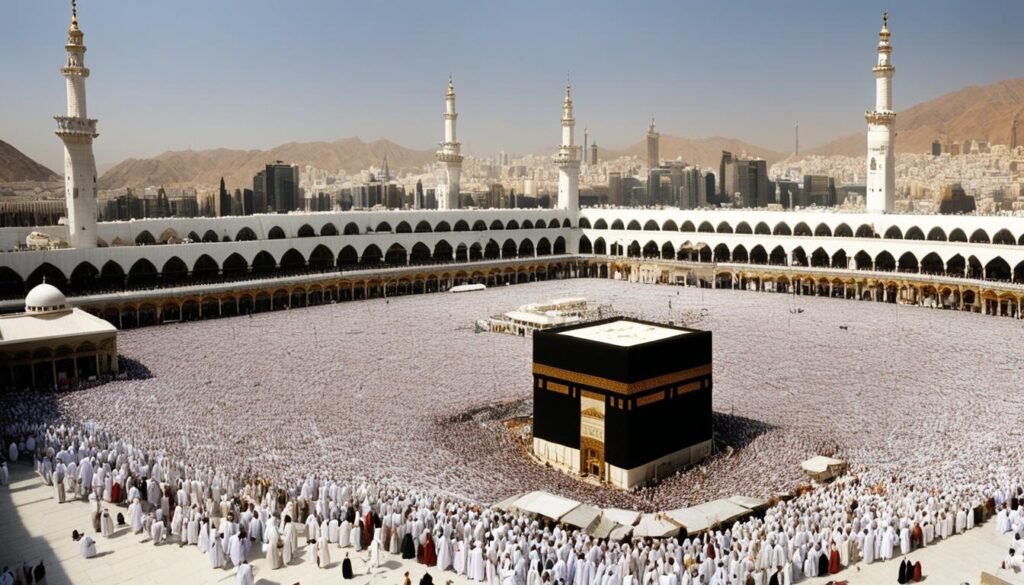
The Hajj pilgrimage is a testament to the strength of the Muslim community and the universal nature of Islam. It is a journey that transcends geographical boundaries, bringing people together in a shared devotion to God and a commitment to living a righteous and purposeful life.
Sacred Places and Shrine Visits
Islam holds certain places in high regard, with Mecca being the most sacred for Muslims. The Kaaba, located in Mecca, is believed to be the physical representation of God’s divine presence on earth. It is the direction towards which Muslims around the world turn to pray, making it the spiritual center of Islam. This holy site holds great significance and symbolism for believers, and pilgrims travel from all corners of the globe to visit the Kaaba and perform the Hajj pilgrimage.
Another revered location in Islam is the Prophet’s Mosque in Medina, where the Prophet Muhammad is buried. It is a place of immense reverence, and Muslims visit to pay their respects and seek blessings. The Prophet’s Mosque is a symbol of the unity and brotherhood within the Islamic community. Pilgrims gather here to offer prayers and to immerse themselves in the history and teachings of the Prophet.
Jerusalem is also regarded as a sacred place in Islam due to its historical and religious significance. It is home to the Al-Aqsa Mosque, the third holiest site in Islam. According to tradition, the Prophet Muhammad ascended to heaven from here during the Night Journey, making it a place of great spiritual importance. Muslims visit Jerusalem to pray at the Al-Aqsa Mosque and to connect with the shared heritage of the Abrahamic faiths.
Additionally, Sufism, a mystical branch of Islam, places great emphasis on the veneration of saints and their shrines. Sufi saints are believed to have achieved a high level of spiritual enlightenment and closeness to God. Visiting their shrines is seen as an act of seeking spiritual inspiration and blessings. These shrines serve as places of reflection, prayer, and remembrance, attracting devotees who seek solace and guidance.
| Sacred Place | Location | Significance |
|---|---|---|
| Kaaba | Mecca | The holiest site in Islam, believed to be the house of God |
| Prophet’s Mosque | Medina | The burial place of the Prophet Muhammad, a place of spiritual connection |
| Al-Aqsa Mosque | Jerusalem | Significant historical and religious associations, the third holiest site in Islam |
| Sufi Shrines | Various locations | Places of spiritual inspiration and blessings |
The Role of the Mosque
The mosque plays a pivotal role in the Islamic faith, serving as a place of worship, community gathering, and religious education. It holds a central position in the lives of Muslims, embodying the essence and spirit of Islam.
The significance of the mosque can be traced back to the early days of Islam when it served as the epicenter of all community life. It not only provided a space for congregational prayers but also served as a hub of social, cultural, and educational activities.
The mosque is usually led by an imam, a knowledgeable and respected religious leader who leads congregational prayers. The imam’s role extends beyond leading prayers; they also play a vital role in guiding the community, delivering sermons, and providing spiritual guidance.
Furthermore, mosques are not limited to serving the spiritual needs of the community. Many mosques offer educational programs, teaching Islamic principles, the Quran, and other subjects. They also provide platforms for social activities that foster a sense of unity and brotherhood among Muslims.
In addition to that, mosques often engage in charitable initiatives, extending their support to the less fortunate and those in need. These initiatives can include providing food, clothing, healthcare, and educational assistance to those in the community and beyond.
The Significance of the Mosque in Islam
The mosque holds deep significance in Islam for multiple reasons:
- It serves as a physical and spiritual place where Muslims can connect with Allah through prayer, seeking solace, guidance, and blessings.
- It acts as a symbol of unity, bringing Muslims from diverse backgrounds together under one roof, fostering a sense of communal harmony and brotherhood.
- It provides a platform for Islamic learning, spreading knowledge, and deepening understanding of the faith.
- The mosque acts as a spiritual anchor within the community, offering support and guidance to individuals and families in times of joy, sorrow, and hardship.
- It is a manifestation of the Islamic architectural heritage, reflecting both cultural and religious identity.
The significance of the mosque in Islam cannot be overstated. It serves as the heart of the Muslim community, fulfilling diverse needs and embodying the fundamental principles of faith, unity, and charity.
Holy Days and Festivals
Islam is a vibrant religion that celebrates various holy days and festivals throughout the year. These occasions hold great significance for Muslims worldwide, bringing communities together in joyous observance and reflection. Let’s explore some of the most notable Islamic holy days and festivals.
Eid al-Fitr: Celebrating the End of Ramadan
One of the most anticipated celebrations in the Islamic calendar is Eid al-Fitr, which marks the end of the holy month of Ramadan. This joyous occasion is a time of feasting, gratitude, and generosity. Families come together to share special meals, exchange gifts, and extend acts of charity to the less fortunate.
During Ramadan, Muslims fast from dawn until sunset, abstaining from food and drink. Eid al-Fitr serves as a reward for this period of fasting and self-discipline. It is a time for Muslims to express their gratitude to Allah for the strength to complete Ramadan and to seek forgiveness for any shortcomings.
Eid al-Adha: The Festival of Sacrifice
Eid al-Adha, also known as the Festival of Sacrifice, commemorates the willingness of Ibrahim (Abraham) to sacrifice his son as an act of obedience to Allah. This important holiday is marked by prayer, acts of charity, and the sacrifice of an animal, such as a sheep or a goat.
During Eid al-Adha, Muslims from around the world gather to perform the Hajj pilgrimage in Mecca, following in the footsteps of Prophet Ibrahim. The festival is a time of deep spiritual reflection, sacrifice, and rejoicing in the boundless mercy and blessings of Allah.
Other Significant Holy Days
Islam also observes other significant holy days and occasions, which hold particular importance within the faith. These include:
- The Night of Power (Laylat al-Qadr): A night of intense devotion and spiritual significance, believed to be when the first verses of the Qur’an were revealed to the Prophet Muhammad.
- Ashura: Commemorating the martyrdom of Imam Hussein, the grandson of Prophet Muhammad. It is a day of reflection, mourning, and remembrance.
These holy days and festivals enrich the spiritual journey of Muslims, reinforcing their faith and providing opportunities for communal worship, reflection, and strengthening of family and community bonds.
| Holy Day/Festival | Date |
|---|---|
| Eid al-Fitr | The first day of the Islamic month of Shawwal, immediately following Ramadan |
| Eid al-Adha | The 10th day of the Islamic month of Dhul Hijjah |
| The Night of Power (Laylat al-Qadr) | The 27th day of Ramadan |
| Ashura | The 10th day of the Islamic month of Muharram |
Conclusion
In conclusion, Muslim prayer traditions encompass a rich tapestry of rituals and practices that hold deep spiritual significance for Muslims. These traditions are rooted in the belief that prayer is an essential aspect of the Islamic faith, serving as a means of establishing a deep spiritual connection with God. From the five daily prayers to the observance of fasting during Ramadan and the pilgrimage to Mecca, each practice serves as a powerful reminder of the importance of devotion, submission, and personal growth.
By engaging in these prayer traditions, Muslims not only fulfill their religious obligations but also cultivate a sense of self-discipline, inner peace, and community bonding. Through the intricate physical postures, recitations from the Qur’an, and acts of charity, Muslims strive to align their hearts, minds, and actions towards a life of piety and righteousness. These prayer traditions serve as constant reminders of the presence of God in their daily lives.
Moreover, the various prayer traditions within Islam emphasize the values of humility, compassion, and gratitude. As Muslims engage in prayer, they acknowledge their dependence on God and the blessings bestowed upon them. The regularity and structure of these practices provide a framework for Muslims to navigate the complexities of life, find solace in times of hardship, and seek guidance and forgiveness.
In summary, Muslim prayer traditions are a central pillar of the Islamic faith, fostering a profound connection with the divine, promoting personal growth, and nurturing a strong sense of community. These practices offer Muslims a pathway to spiritual enlightenment, inner peace, and a deeper understanding of themselves and their place in the world.
FAQ
What are the five daily prayers in Islam?
The five daily prayers in Islam are Fajr (before sunrise), Dhuhr (just after noon), Asr (late afternoon), Maghrib (immediately after sunset), and Isha (before bedtime).
How should I perform Muslim prayers?
Muslim prayers involve specific physical postures and recitations from the Holy Qur’an. These include standing, bowing, and prostrating. It is important to face the qibla (direction of Mecca), observe the correct order of movements, and maintain focus and humility during prayer.
What is the significance of ablutions and prayer etiquette?
Before each prayer, Muslims perform ablutions, known as wudu, to purify themselves before standing in front of God. Prayer etiquette includes wearing appropriate clothing, facing the qibla, and maintaining a state of focus and humility.
What is the importance of Friday prayers and special congregational prayers?
Friday prayer, held at the mosque, replaces the regular afternoon prayer and includes a sermon delivered by the imam. Special congregational prayers, such as tarāwīḥ during Ramadan, provide opportunities for increased devotion and worship.
Are there any specific prayers for the night?
Tahajjud prayers, performed during the latter half of the night, are encouraged for seeking closeness to God. Muslims may choose to wake up before dawn to perform these voluntary prayers as an act of devotion.
What is zakat and why is it important?
Zakat is an obligatory tax in Islam, meant to purify wealth and assist the less fortunate. It is payable annually and collected from specific categories of wealth. Zakat helps support the poor and can be used for various purposes, including education and healthcare.
What is the significance of fasting during Ramadan?
Fasting during Ramadan is one of the pillars of Islam. It involves abstaining from food, drink, and other physical needs from dawn to sunset. Fasting is a time for spiritual reflection, self-discipline, and increased devotion to God.
What is the Hajj pilgrimage to Mecca?
The Hajj pilgrimage to Mecca is an obligatory religious duty for financially and physically able Muslims. It involves a series of rituals and prayers in and around the sacred sites of Mecca, symbolizing unity, humility, and devotion to God.
Which places are considered sacred in Islam?
The most holiest place for Muslims is Mecca, where the Kaaba is located. The Prophet’s Mosque in Medina and Jerusalem also hold significant religious and historical associations. Additionally, shrines of Sufi saints are highly revered in Islam.
What is the role of the mosque in Islam?
The mosque serves as a place of worship, community gathering, and religious education. It is led by an imam who leads congregational prayers and delivers sermons. Mosques also offer educational programs, social activities, and charitable initiatives.
What are some of the Islamic holy days and festivals?
Islamic holy days include Eid al-Fitr, which marks the end of Ramadan and is a time of feasting and gift-giving, and Eid al-Adha, commemorating the willingness of Prophet Ibrahim to sacrifice his son. Other significant days include the Night of Power and the Ashura, commemorating the martyrdom of Imam Hussein.
What are the main aspects of Muslim prayer traditions?
Muslim prayer traditions encompass a range of rituals and practices that hold deep spiritual significance. They emphasize the importance of spiritual connection, devotion, and submission to God. Prayer fulfills religious obligations while also providing opportunities for personal growth, self-discipline, and community bonding.


